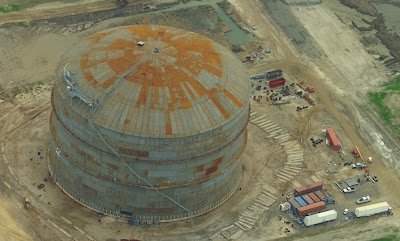Post taken from Manufactured landscapes: LNG storage tanks and totally written by PC Gladiator
LNG tanks are the biggest type of storage tanks in the world. LNG stands for Liquid Natural Gas. These tanks are specially designed to maintain the -163 degrees celcius temperature to keep the natural gas liquid. The relatively high cost of production of LNG and the need to store it in expensive cryogenic tanks ( to maintain the low temperatures ) gives the need of big tanks ( larger then in the oil industry ) to minimize costs. LNG tanks are always of double-wall construction with extremely efficient insulation between the walls. Large tanks are low aspect ratio (height to width) and cylindrical in design with a domed roof. There are a lot of safety measures to these tanks because if it escapes from a storage tank or ship, it can quickly vaporize. If this vapor ignites, it can create an immense fireball that would incinerate everything in its path.
The biggest LNG storage tank in the world is situated on Elbas Island near Savannah in the U.S. Below you can see some pictures ( from live search maps birdview) during it's construction:
The world's largest LNG export terminal is called the Sakhalin II terminal and is situated on the Sakhalin island in the Russian Far East. The storage tanks on this project belong to the largests in the world and have a storage capacity of 1.2 mln barrels (190,000 m3 ), The picture below shows what a giant impact these structures have on the once peaceful beach of the village nearby:
Another large LNG terminal is the Bontang LNG Plant in Bontang in Indonesia. The 6 tanks on this site are all more then 80 metres in diameter:
And what about the liquefied natural gas storage tanks at the Yemen L.N.G project which was recently build near (not yet visible in google maps) Balhaf in Yemen. These storage tanks are aboslutely huge as you can see in the pictures below (Click to enlarge)
Here you can see a worker who walks through one of two main storage tanks:









Good article. Can I use it on my site about LNG (russian site - lngas.ru)?
ReplyDeleteDear Artem: the original post has been written by PC Gladiator in 2009. I asked for permission and I repusblished it. My advice is ask PC Gladiator first.
ReplyDeleteWow! Those storage tanks are definitely huge! It's astonishing to see structures as large as these, and think about it, these are not water storage tanks, but large liquefied natural gas tanks. It might be dangerous to people living near these structures. Well, the structure on the first two pictures needs to be replaced as potential leaks may occur because of those rusting areas.
ReplyDeletevery nice piece of information shared in this blog.
ReplyDeletethanks a lot for sharing
http://www.inoxindia.com
WOOW !!!! What a helpful blog and impressive tropic to LNG storage tanks, Cheers author for your great post and article about LNG storage tanks
ReplyDeleteliquid storage tanks australia
Thank you for the insightful information on LNG tanks. Their immense size and the advanced technology required to maintain the low temperatures are impressive. The safety measures in place are crucial given the potential risks of LNG vapor. It's fascinating to learn about the world's largest tanks, including those on Elbas Island and at the Sakhalin II terminal. I recommend considering FRP tanks for their durability and resistance to corrosion in various storage applications.
ReplyDeleteThank you for the insightful information on LNG tanks. Their immense size and the advanced technology required to maintain the low temperatures are impressive. The safety measures in place are crucial given the potential risks of LNG vapor. It's fascinating to learn about the world's largest tanks, including those on Elbas Island and at the Sakhalin II terminal. I recommend considering FRP tanks for their durability and resistance to corrosion in various storage applications.
ReplyDelete